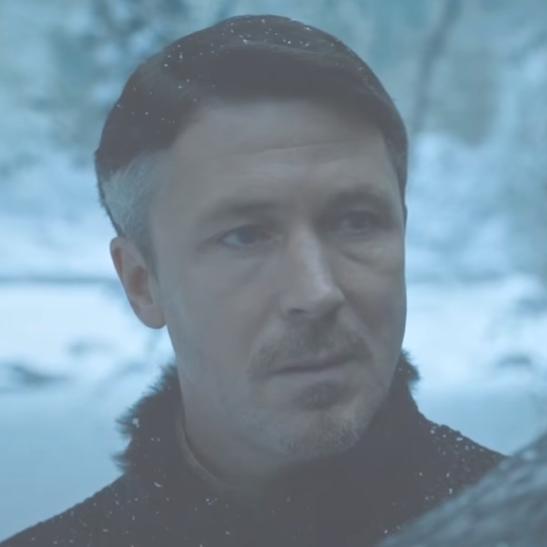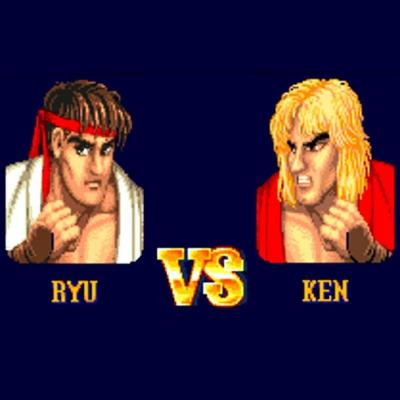Ryu: “Ken…. It’s good to see you! Long time no see, old friend!”
Ken: “Ryu…. You haven’t changed! You know the drill. Let’s do it!”
– Street Fighter III: 2nd Impact
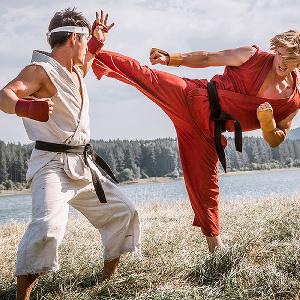
Ryu and Ken, from Capcom’s Street Fighter series, are perhaps the two most well-known and iconic fighting game characters. In the canon of the games, Ryu and Ken were raised together as brothers, living and training together in the same dojo, under the tutelage of Sensei Gouken.
As lifelong sparring partners, it’s no surprise that they developed an intense rivalry. Both of them, not wanting to lose to the other, were driven to train harder, train smarter, and push themselves further than they would have done without the shadow of their great rivalry bearing over them.
This is the motivational power of rivals – they provide a boost that we may struggle to give to ourselves naturally. If you identify a rival for yourself (and they don’t even have to know that they are your rival), you can harness this effect to boost your own motivation.
A word of warning though – you have to do this the right way. Ryu and Ken’s rivalry is healthy and positive for them both – but competition can easily turn bitter. Jealousy, hate, and insecurity can turn a healthy rivalry into something very negative. It can become an obsession. It can make you miserable.
Having said that, the reverse is also true – a healthy rivalry can become the antidote to jealousy, hate, and insecurity. It can help you turn these negatives into positives. We’ll explore all of this in depth today.
Bitter rivalries
Sagat: “You scarred me and sealed your fate. Now the scales will be balanced. You took my honor and I’ll destroy you!”
Ryu: “You just don’t get it, do you?”
Sagat: “Shut up! I won’t lose this time!”
– Street Fighter Alpha
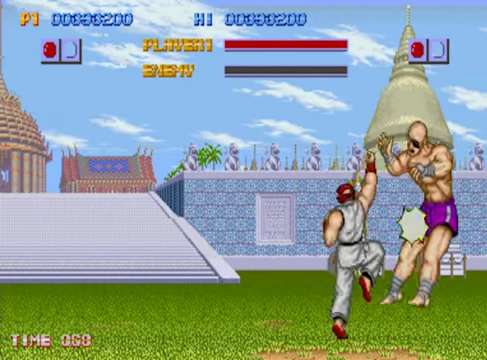
We don’t have to go far to find an example of a bitter rivalry. In the first Street Fighter tournament Ryu left the Muay Thai champion Sagat with a huge diagonal scar across his chest, fuelling Sagat’s deep hatred of Ryu. By Sagat’s own admission, he became obsessed with Ryu, and felt like a loser after their fight.
A bitter rivalry like this is bad for us – not just for our sense of well-being, but for our ability to perform at our best, too. The reason for this, is because our self-esteem becomes wrapped up in our comparison with the other person. But we cannot control what the other person does, only what we do – so our happiness is out of our control also.
In the modern world, bitter rivalries tend to stem from jealousy, rather than defeat. We become jealous of people who already have what we want – whose success highlights our own shortcomings. In his book “The Infinite Game,” business writer and self help guru Simon Sinek gives a great account of this, describing his own bitter rivalry with another writer called Adam Grant.
Sinek and Grant do basically the same job. They write books, advise companies, and give talks on similar topics. They were rivals, each the other’s main competitor. For Sinek, unfortunately, the rivalry became bitter. He became obsessed with Grant, constantly comparing their book sales. If he was selling better than his rival, he’d be ecstatic. If he was selling worse, he’d be crestfallen. Every one of Grant’s successes made Sinek hyper aware of his own insecurities. His very happiness was wrapped up in how he compared himself to Grant. Even just hearing the name “Adam Grant” would make Sinek uncomfortable.
While a rivalry like this certainly provided some motivation for Sinek, it is obviously not a recipe for a happy or balanced life. Sinek found a better way though.
Worthy Rivals
Ken: “Ready to go at it one more time, old friend?”
Ryu: “Through all the years, you still remain my most worthy opponent!”
– Street Fighter III: 2nd Impact

Compare Sagat’s rivalry with Ryu, to Ken’s and Ryu’s rivalry. Theirs is far more positive. When they grew up, they would help each other train. I’m sure, that if Ryu noticed some flaw in Ken’s technique, he would tell Ken about it. That might sound crazy. Why would you help your opponent beat you? But actually, it’s very logical. Above all, Ryu wanted to improve his skills. The better Ken is, the better he’ll be able to help Ryu achieve that.
Now, this doesn’t mean that they each aren’t trying hard to best the other. Far from it! Their rivalry helped both of them to harness new skills and develop their own style, Ryu developing a defensive, fireball-focused style, and Ken morphing into a more aggressive rush-fighter. They developed their physical and mental conditioning to peak human levels, partly because they both knew their rival was doing the same. They didn’t want to get left behind.
But, their ultimate goal with all this was not to defeat the other – it was to make themselves stronger.
The Infinite Game
This is an example of what Simon Sinek calls “The Infinite Game.” Let’s take a moment to define what that is, as compared to a finite game.
In a finite game, there are known players with fixed rules. There is a goal which each player tries to achieve, and if they do so, the game ends. The game has a clear beginning, middle, and end, and the purpose is to win. So pretty much any card game, board game, video game, and sport fits into this category.
In an infinite game, however, there are no clear players (at least in the sense of opponents competing against each other). There are no exact or clearly defined rules. There is no timeline. The purpose is not to win, but to keep playing.
Simon Sinek was playing a finite game – sell more books than Adam Grant. Sagat was also playing a finite game too – defeat Ryu.
But Ryu and Ken are playing an infinite game. They are trying to reach an ideal of perfection, one that cannot be defined in advance, but which they strive towards nonetheless. There is no way to win this game. They will never become “perfect” – their only goal is to keep playing, to keep striving.
We see a good example of this in Ken’s ending in Street Fighter Alpha 2. Ken won because Ryu was distracted, and rather than gloating or celebrating (as he does against pretty much everyone else), Ken gives Ryu some advice: “Get up Ryu! Something’s bugging you, your heart wasn’t in it this time. That battle with Sagat really messed with your head man. Stay focused! Remember, it’s nothing but the fight.”
Ken then gives Ryu his headband as a reminder to stay focused. Ryu thanks Ken for his help, and they go their separate ways, promising to meet and fight again. When Ken gets back to Eliza, he admits, “I was lucky … I’ve got to pump up my training or I won’t be so lucky! Next time… he’ll be helping me up!”
Ken doesn’t celebrate the win, because he wants Ryu at his best. That will provide him with the challenge he needs to assess and develop his own skills, to highlight the weaknesses in his style, and show him where he can improve. Without Ryu at his best, the victory is meaningless to him.
If Sagat had defeated a distracted Ryu, it’s more likely that he would find meaning in such a victory. Although, to be fair on Sagat, this is not completely clear – in Alpha 3 he tells Bison that he wants to beat Ryu at his best. However, his hatred, his bitter rivalry makes him more likely to take pleasure in any victory. It’s more likely that part of him – at least in the early days following his scarring by Ryu – would just like to see his rival crushed before him.
Dealing with failure
Ryu: “If defeat discourages your fighting spirit, think of what you have gained by learning.”
– Street Fighter III: 2nd Impact
Just as a worthy rivalry removes the false pleasure of an easy win, it also takes the sting out of a nasty defeat – and for the exact same reason. If Ryu defeats Ken, of course Ken will feel disappointed. But failure is a teacher, and it’s much easier to see this when you are defeated by a worthy rival than by a bitter rival.
After picking himself up, Ken can analyse the match, to see where he went wrong. Was there something off with his strategy? Was it a physical issue, that he could rectify with more strength or endurance training? Did he lose focus, meaning he should increase his mental training?
Now imagine Sagat had lost to Ryu. How do you think he’d feel after that? Much, much worse, right? Losing to Ryu would hit Sagat harder than any other loss. It would fuel his own insecurities, prove all his self-doubts. He wouldn’t be in the right mental place to learn from the defeat – “hindered by his own mawkish self-pity,” as Tessa might say. He might sink to a low place for a while (though, as a warrior, he’d eventually pull himself out of it).
Finding YOUR worthy rival
Ryu: “Seek an opponent who is your equal. Only then can you improve.”
– Street Fighter III: 3rd Strike
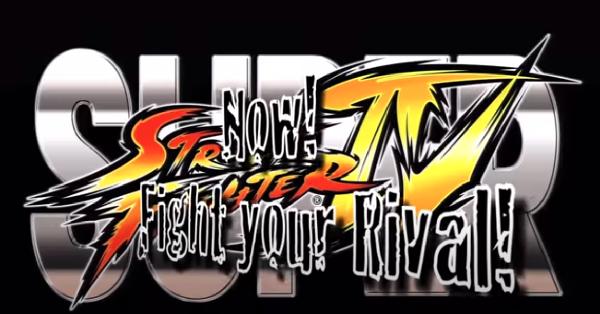
Identifying your own worthy rival can help you boost motivation in your own pursuits. Like Ryu and Ken, it can drive you to put the hard work in, to make sacrifices when you otherwise wouldn’t.
Think of a goal you have, and then think of someone who could be a worthy rival for that goal. It can be anyone – a competing business, a friend, a foe, a collaborator, an acquaintance. It could be someone you like, or someone you dislike. All that matters, is that they are pursuing the same or a similar goal, but they are better than you in some way.
Don’t pick someone vastly superior to you. If you’re an intermediate-level boxer, then the current heavyweight of the world is not a suitable rival! Likewise, don’t pick someone way below your level – so the beginner who just joined your club is not suitable either. They should be around your level, but have some kind of an edge over you, in certain respects, if not in all. If there’s someone you feel a little insecure, jealous, or concerned about, then they might be a good choice.
Next, make sure that you’re playing an infinite game! If you fall into a finite game, a worthy rivalry can quickly turn bitter. An amazing example of this happened in 1981. Apple had the lion’s share of the personal computer market at that time, but then IBM, one of the biggest technology companies of the age, entered the market. What did Apple do? The took out a ad in the Wall Street Journal, welcoming IBM to the market!
Apple were playing the infinite game – putting more computing power into the hands of the individual. IBM joining the market was a good thing, because it would help them do that! At the same time, they’d have a worthy rival to learn from, and help them improve. IBM, on the other hand, played a finite game, trying to defeat Apple – to take their customers and market share. Years later, IBM dropped out of the personal computer market, while Apple went on to dominate it – so we know how these strategies worked out in this case!
Note that a worthy rivalry doesn’t have to be a two-way street. You don’t have to know your worthy rival personally – and they certainly don’t need to know you. Pick whoever motivates you, someone who drives you to improve in some area.
Turning jealousy into a worthy rivalry
Sagat: “I’ve spent so long thinking only of defeating Ryu… feeling like a loser. But now, I realize that winning is of little consequence. What matters is communicating through one’s fists. Maybe THIS is what I really desired all along. You*…Your fists were mute. They had no soul. I was once empty like you. Have I changed? Only one man can answer that question.”
* He’s referring to Seth here
– Street Fighter IV
Later in the Street Fighter series, Sagat comes to learn everything we’ve been discussing here. As you see in the above quote, his rivalry with Ryu cools, and moves from a bitter rivalry to a worthy one. This is also shown in the Street Fighter Udon comics.
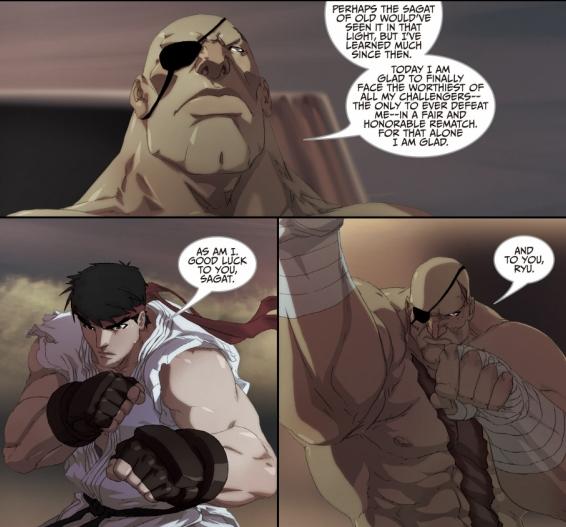
This is absolutely possible in the real world too. I mentioned Simon Sinek’s rivalry with Adam Grant earlier. Well, those two are now close friends! They are still rivals, and they still use each other as motivation. But they don’t suffer the same obsessive focus on the other.
How did they do this? By switching to an infinite game! They both have the same goal – to educate and inform people on their specialist topics. If the other is doing well and selling more books, that’s great, because they are helping keep the infinite game going. In the infinite game, there’s room for them both.
Use your rival
Once you’ve identified your worthy rival, use them whenever your motivation dips.
When you want to watch TV instead of working on that project. When you feel like skipping the gym today. When you’re thinking of ordering desert even though you’re not really that hungry. Whatever it is, bring your worthy rival to mind. Remember, they will be out there, right now, doing the thing that you’re thinking of shirking.
Then, analyse your rival. They do something better than you, something that you would like to do better. They get a result that you want. How are they doing this? Are there systems, processes, beliefs, techniques, or technologies that they are employing, but you are not? If so, what are they, and can you use them too?
Also, think about what are you doing that they are not. Does your rival highlight anything you are doing well? also does your rival highlight anything you are doing that might actually be counterproductive?
Always be mindful of your thoughts towards your rival. Stay away from jealous, hateful, and bitter thoughts. Remind yourself of the infinite game, and remind yourself that your rival helps you improve. In an infinite game, their success does not take away from your own – there’s plenty of room for you both.
Where to get the stuff discussed here
Note: the below are affiliate links, meaning lessonsfromheroes.com will earn a commission if you buy the products after following the link.
The Street Fighter games ( Amazon US | Amazon UK)
Capcom’s legendary Street Fighter games are probably the most famous and iconic fighting games out there. They were the first to turn 2D, one-on-one fighting games into a true skill – yes you can have fun button bashing, but there’s a much higher level you can reach with these games, if you develop your timing, coordination, and strategy to their limits. And with online play, there’s plenty of opportunity to find yourself a rival.
Street Fighter: Assassin’s Fist (Amazon US | Amazon UK)
The featured image of this post comes from the incredible Street Fighter: Assassin’s Fist, directed by Joey Ansah and featuring Mike Moh as Ryu (who also played Bruce Lee in Once Upon a Time in Hollywood!), Christian Howard as Ken, and Akira Koieyama as Gouken. The theme of rivalry flows throughout the film, which documents the formative parts of Ryu and Ken’s training under Gouken.
The Infinite Game (Amazon US | Amazon UK)
Simon Sinek goes into more detail about infinite games and worthy rivalry in this book. It has a business focus, but you can draw out lessons to apply in everyday life. Once you learn about finite and infinite games, you’ll start seeing them everywhere.
Udon Entertainment’s Street Fighter Comics (Amazon US | Amazon UK)
Udon’s Street Fighter comics explore the backgrounds of the Street Fighter characters in more depth – they have runs that cover most of the characters, and many are available in trade and hardback form, so pick your favourite character and enjoy!
